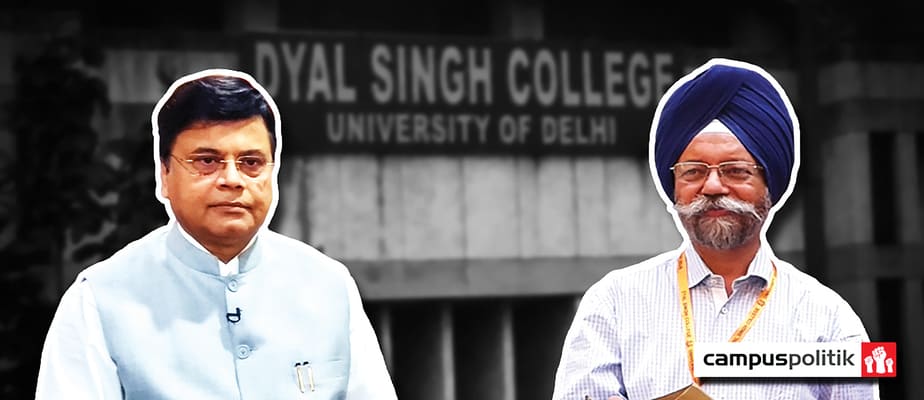
On Monday, the morning of September 24, the students, faculty, working staff and even the principal of Dyal Singh (Morning) College stood outside the college premises, caught by surprise as they were denied entry to the college without any prior information. A notice was put up on the gate the same morning, declaring a holiday which was previously suggested by Chairman Amitabh Sinha to the Principal IS Bakshi. Bakshi had refused to declare the day off on the grounds that Sinha was issuing “unilateral dictates”.
According to PK Parihar, a professor in the college’s geography department, the holiday was due to a spontaneous governing body meeting called by Sinha, the chairman of the college governing body. Parihar said, “Students, faculty and staff started pouring in from 8 am. Since they were denied entry inside the college, they sat drenched in the rain, waiting for clarification. I completely fail to understand why such a meeting would be called instantly and why we need a day off for such a meeting. We have had governing body meetings in the past; we don’t have to sacrifice students’ classes for it. By doing this today, the chairman is just trying to showcase his power over the college.”
Parihar said a senior professor of the physics department, Naveen Kaur, was severely hurt on his arms as he demanded the gates to the college be opened. An FIR in the Lodhi Colony police station has been lodged against whom they call the chairman’s ‘bouncers”— allegedly responsible for guarding the college as per the chairman’s orders, and not letting people inside. There is also a video available of the alleged “bouncers” holding Naveen Kaur’s arm.
Chairman Amitabh Sinha is also a lawyer and a member of the National Executive Committee of the Bharatiya Janata Party. Sinha has also previously been charged with several grave offences by students and professors—accused of massive corruption, “illegally” occupying an office in Dyal Singh (Morning) College despite protests, and interfering in the college student body elections.
Sachin Nirmal Narayana, a professor who was denied entry to the college, wrote on Facebook: “Chairman’s Bouncers threaten and manhandle teachers and students at Dyal Singh College. Teachers and students of Dyal Singh College denied entry and stopped at the gates by GB Chairman’s order. Classes are not being held. Students and teachers stake out JLN Metro and Lodi Road in heavy rains as they are denied entry.”
Monday’s fiasco was a culmination of the debate between Sinha and principal IS Bakshi regarding the suspension of the newly-elected president of the college. Rohan Awana, Akhil Bharatiya Vidyarthi Parishad member and a first-year student of B.A. (H) Sanskrit, was suspended from the post of president of the college on September 18—just one week after the elections—owing to violation of several rules of the Election Code of Conduct, as per a notice issued by the college authorities. He was accused of violating Points 2, 9, 16 and 19 of the Code of Conduct: that his age was not as required, that he did not submit complete and audited accounts to the college/university authorities, that he/his supporters engaged in defacement of college properties, and that the college may take disciplinary action against such a violator or choose to cancel his candidature.
Immediately after the notice was put up, another notice undersigned by Amitabh Sinha was put up, giving instructions for staying the order and declaring that the matter be put up before the next governing body meeting for the matter to be handled in a more “judicious manner”—in essence, reinstating his post as president.
College governing bodies have no role in the conduct of the student union elections, as Delhi University has already set up a six-member council for the DUSU elections this year. The principals of all colleges have also been made the election officers during the DUSU elections, while the chairman explicitly has no role to play in this, as the chairman holds an honorary position with no administrative power.
In a letter, the principal refused to attend the meeting called by Sinha, deeming it illegal due to the lack of the requisite number of members nominated by the Election Commission. The governing body of a college consists of a chairman, the principal, two or three staff members, one non-teaching member and five to eight people appointed by the executive council of Delhi University. There are currently only two members appointed by the executive council, hence the principal’s objection. According to a senior professor of the college, no member from Dyal Singh (Morning) College participated in the meeting in solidarity with the principal.
Late one evening, IS Bakshi was charged with “certain serious allegations regarding financial and administrative irregularities” and asked to “proceed forthwith on leave and to avoid visiting the college premises during the pendency of the enquiry against him” by Amitabh Sinha. He was told to give his office keys to Evening Principal Pawan Kumar Sharma—in effect, an indefinite suspension.
In response, Bakshi has refused to follow Sinha’s orders on the grounds that the allegations made against him are with “mala fide intentions” and without any evidence. He has also requested Sinha not to interfere in the smooth functioning of the college for his “personal benefits”.
Now the question arises: what is the scope of the power practised by chairpersons with strong political affiliations? And how long can their personal ideologies be allowed to meddle in administration without any consequences?
www.newslaundry.com
The initiative focused on a victim-centric approach and aimed at strengthening public trust through proactive…
Six of the suspects have been arrested from different parts of Tamil Nadu and will…
The weather department has predicted a mainly clear sky during the day with the maximum…
The likely Rs 1,000 crore sale of the Tehri Garhwal House, former royal residence on…
On the principle of 'Sarvajan Hitaya, Sarvajan Sukhaya' -- Welfare for all, Happiness for all…
With hundreds reported missing in Delhi this year, this guide explains how families can use…